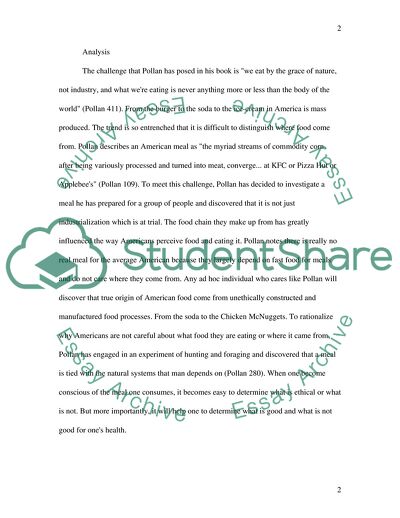
- Home
- Free Samples
- Premium Essays
- Editing Services
- Extra Tools
- Essay Writing Help
- About Us
- Studentshare
- Subjects
- Miscellaneous
- Prepare a meal
Prepare a meal - Essay Example

- Subject: Miscellaneous
- Type: Essay
- Level: Masters
- Pages: 4 (1000 words)
- Downloads: 0
- Author: bergstromcathar
Extract of sample "Prepare a meal"
The result is that Americans is always on the look out for the "best diet" and have developed the "omnivores dilemma" when it comes to decision pertaining food. On the other hand what are the alternatives? The alternative to mass produced food is hunting-gathering, which is not feasible as the source of food in todays age of industrialization when man is constrained by work hours, desk jobs and social obligations to be aligned with natures food chain. In the following the researcher shall analyze the ethics of eating by first analyzing Pollans philosophy.
This is then followed by a detailed account of the writer’s own experience of preparing a meal with the view to analyze how valid are Pollans claims. The challenge that Pollan has posed in his book is "we eat by the grace of nature, not industry, and what were eating is never anything more or less than the body of the world" (Pollan 411). From the burger to the soda to the ice-cream in America is mass produced. The trend is so entrenched that it is difficult to distinguish where food come from.
Pollan describes an American meal as "the myriad streams of commodity corn, after being variously processed and turned into meat, converge. at KFC or Pizza Hut or Applebees" (Pollan 109). To meet this challenge, Pollan has decided to investigate a meal he has prepared for a group of people and discovered that it is not just industrialization which is at trial. The food chain they make up from has greatly influenced the way Americans perceive food and eating it. Pollan notes there is really no real meal for the average American because they largely depend on fast food for meals and do not care where they come from.
Any ad hoc individual who cares like Pollan will discover that true origin of American food come from unethically constructed and manufactured food processes.
...Download file to see next pages Read MoreCHECK THESE SAMPLES OF Prepare a meal
Contemporary Christian Thinkers Put the Christian Story to Work
Psy brochure project
Practical Approach to Dealing with Omnivore
Service Outputs Supply
Cold Mountain by Charles Frazier
Use of fire in the novel Hunger Games
Experiment Convenience
Rhetorical Analysis: IS Junk Food Really Cheaper

- TERMS & CONDITIONS
- PRIVACY POLICY
- COOKIES POLICY